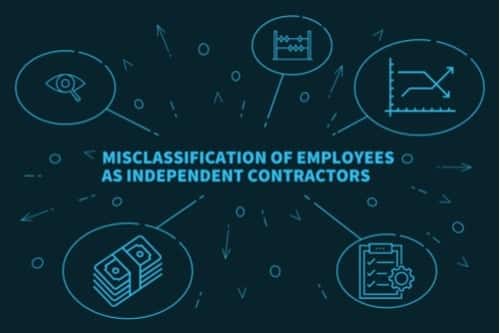Can Independent Contractors in Ohio Get Workers’ Compensation Benefits?
The short answer is “DEPENDS”—the Ohio workers’ compensation system protects employees who are injured or contract illnesses on the job.
An “employee” under Ohio Workers’ Compensation law is a term of art and can include persons denominated by employers as “independent contractors.”
Legitimately actual independent contractors are legally self-employed, and as such doesn’t qualify for benefits. But if the self-employed contractor is actually in the employment and under the CONTROL as to the terms and conditions of employment then the answer may be otherwise.
In short, the reality isn’t always straightforward.
Changes in the job market, including the increasing ability to perform many types of work remotely, have led to an increase in the number of workers classified as independent contractors. The growing ranks of the self-employed span virtually all industries and income levels, ranging from highly-trained and highly-paid professionals to Uber drivers, virtual receptionists, and even day laborers.
But, many of those workers are legally misclassified. That is, although their employers treat them as independent contractors and the workers see themselves that way, state and federal laws deem them employees for various purposes—minimum wage requirements, overtime pay regulations, taxes, unemployment insurance, and workers’ compensation.
What is a Misclassified Worker?
“Misclassified” is the Internal Revenue Service (IRS) term for a worker who is legally an employee, but who is being treated as an independent contractor.
Employers misclassify workers for many reasons.
Sometimes, the misclassification is an honest mistake. However, businesses have a strong financial incentive to treat employees as self-employed contractors. Classifying a worker as an independent contractor allows the employer to avoid payroll taxes, employee benefits, unemployment insurance obligations and more.
While misclassification often benefits the employer, it’s bad for nearly everyone else. It leaves the worker vulnerable since an independent contractor doesn’t qualify for workers’ compensation benefits or unemployment benefits. The worker must generally also pay higher taxes as a self-employed person because there is no employer contribution.
Misclassification Hurts Ohio’s Economy
Businesses that wrongly classify employees hurt the state and the economy as well.
Nearly a decade ago, the Ohio Attorney General’s office determined that misclassification cheated the state’s unemployment insurance system out of about $100 million per year. Bureau of Workers’ Compensation (BWC) losses were much higher, at an estimated $510 million annually.
Too often, injured workers who have been classified as independent contractors simply assume—or take the employer’s word—that they are not qualified for workers’ compensation benefits.
What Happens When an Independent Contractor Is Injured at Work?
One common scenario that deprives misclassified workers of much-needed benefits plays out like this:
The “independent contractor” is injured on the job. He reports to his supervisor, as employees are instructed to do when they’re hurt. If the injury occurred on the employer’s premises or at a client site, the supervisor may create an incident report. But, the injured employee is advised that as an independent contractor, he’s not eligible for workers’ compensation benefits. So, he’s told, he’ll be responsible for his own medical expenses and will not be compensated for lost work time.
Of course, most workers aren’t familiar with the complex analysis that determines whether they’re contractors or employees. And, they don’t know that the employer’s classification isn’t the final word.
Misclassified Workers May Qualify for Workers’ Compensation Benefits
The Ohio Bureau of Workers’ Compensation doesn’t simply accept the employer’s designation of a worker as an independent contractor. Rather, BWC may determine that a worker designated an independent contractor is legally an employ.
The focus of the BWC and the Industrial Commission of Ohio is upon CONTROL of the terms and conditions of employment. Thus, a misclassified worker may qualify for benefits despite his or her designation. And, the employer may face penalties for falsely classifying the worker as an independent contractor.
If you have been injured on the job and have been advised that you don’t qualify for workers’ compensation because you are an independent contractor, talk to a local workers’ compensation attorney as soon as possible. You may be eligible for benefits, but the sooner you act, the better.
You can schedule a free consultation right now by calling or filling out our online contact form.
The information presented in this post is not legal advice and does not form a lawyer/client relationship. Laws and circumstances can differ and change.
Please contact us for a personal review of your situation







